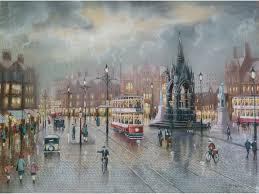 I thought I’d heard all there was to hear about the fall of Anne Boleyn, but I must admit that I never knew that marmalade was involved. It was apparently claimed that Anne used to meet her alleged lovers in the rooms of one of her ladies in waiting, which were also used for storing marmalade. Why her ladies’ rooms were used for storing marmalade, I have no idea. Her accusers claimed that, when a lover arrived, the lady in waiting would tell Anne that the marmalade was there. I dread to think what Paddington Bear would make of this.
I thought I’d heard all there was to hear about the fall of Anne Boleyn, but I must admit that I never knew that marmalade was involved. It was apparently claimed that Anne used to meet her alleged lovers in the rooms of one of her ladies in waiting, which were also used for storing marmalade. Why her ladies’ rooms were used for storing marmalade, I have no idea. Her accusers claimed that, when a lover arrived, the lady in waiting would tell Anne that the marmalade was there. I dread to think what Paddington Bear would make of this.
Marmalade aside, this was a very interesting trilogy of programmes, despite all the silly “let’s create an atmosphere of suspense” music – presumably everyone watching did actually know what was going to happen. Yes, there have been a zillion programmes about Anne Boleyn, and I’d rather have seen one about a different queen; but Tracy Borman is an excellent and very enthusiastic presenter and made some very good points.
The idea of this was to retrace Anne’s steps in the days from her arrest to her execution. A lot was made of the trial being a stitch-up. I would have thought that everyone would take that for granted – was Anne ever going to be proclaimed innocent of all the trumped-up charges of adultery against her (and don’t tell me that any of them were true), any more than Cranmer’s court was ever going to find that Henry’s marriage to Catherine of Aragon was valid? But, as Tracy Borman pointed out, maybe people at the time genuinely weren’t sure. Was the reason it was all so rushed that Cromwell was worried that Henry would change his mind? And why was there no coffin ready for Anne’s body? Did the Tower officials genuinely not think that she was going to end up on the scaffold? Interesting food for thought.
The other main theme was of Anne as a “feisty, outspoken … intellectual powerhouse … way ahead of her time and wasn’t prepared to accept women were second class citizens and weaker than men”. I think a lot of people would say that about Catherine Parr, but it’s fascinating how Anne’s intelligence tends to be overlooked. We know that she was a very intelligent woman. We also know that she held strong views in favour of religious reform. But she’s always cast as the tart who lured Henry into marriage. Really, she tends to have a worse reputation amongst women than among men, because she’s seen as the ultimate enemy of the sisterhood, the nightmare of middle-aged women – the younger, more glamorous woman, who lures a man away from his faithful, loving wife.
That’s twaddle, of course. It wasn’t her fault that Henry went after her. She wanted to marry Harry Percy. And, as Tracy pointed out, she wasn’t even particularly pretty. Did she have alluring ways learnt at the French court? Or could it actually be that Henry was attracted by her feistiness and intellect? Looking at it that way would be quite a boost for feminist interpretations of events.
Come to that, the idea of Catherine of Aragon as a saintly figure who spent all her time sewing clothes for the poor doesn’t work either. This is the woman, the daughter of Isabella of Castile, who was running the country (in Henry’s absence) at the time of Flodden Field, and sent Henry the bloodied surcoat of the dead James IV. Interesting how English history, which is so Protestant, romanticises both Catherine of Aragon and Mary Queen of Scots.
Did Henry get fed up of Anne’s feistiness, and decide that he wanted a more docile wife? Quite possibly. But, ultimately, Anne, like Catherine, was disposed of because she didn’t produce a male heir. The poor woman had just suffered a miscarriage, probably brought on by shock after Henry was involved in a jousting accident. There was no sympathy for her. Nor for Catherine, for all the babies she lost. Out came charges of witchcraft – often used against women, rarely against men. Out came charges of adultery: to impugn a woman, impugn her sexual morals. Her alleged lovers were all executed as well. Collateral damage. Everyone turned against her, even her own uncle, to save their own skins.
Then again, by the latter part of Henry VIII’s reign, no-one was safe, man or woman, wife, cousin, old friend, counsellor. And yet he still manages to be remembered as some kind of big hero: he’s arguably the most recognisable figure in English history. And Anne is vilified.
Strange, isn’t it? And even stranger to think that marmalade was involved in it all …


